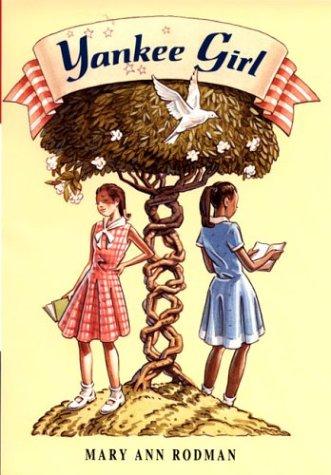
Click on the book to read Amazon reviews
|
Rodman,
Mary Ann.
YANKEE GIRL
New York : Farrar, Straus,
and Giroux, 2004.
IL 5-8
ISBN 0374386617
(3 booktalks)
|
| Booktalk
#1
The year is 1964. Alice
and her family have just moved into their new home in Mississippi.
Alice didn't want to leave Chicago but her father's job with the FBI caused
them to move every couple of years. Alice felt that this would be
like the other moves. She would make some friends and then move to
another place leaving them behind. What she couldn't know is that
this would not be like the other moves at all. Right from the start
she found out that the kids here did not want to be friends with a Yankee
from Chicago. A Yankee who couldn't understand their ways.
To top it all off, the school was being forced to integrate and now "negras"
would be side by side with the whites. When Alice tries to befriend
the new girl, she learns a lesson she would rather not know. That
there was no way for a Negro girl and a white girl in Mississippi to be
friends. No way. Not in 1964.
Booktalk #2
What if you had to move to
a place where people talk with thick, heavy accents and certain people
are treated as if they were invisible? No, it’s not a foreign country
or alien planet. It’s Jackson, Mississippi in the year 1964.
Alice had to move from Chicago to Mississippi because her father’s job.
He works for the FBI and he must help protect black people who are registering
to vote. Alice feels like a fish out of water because she cannot
understand the way people think and act. Alice finds it hard
to adjust and make friends. They call her “Yankee Girl” because of
the way she talks and the way she thinks about black people. But
her main concerns are fitting in with the popular girls at school and trying
to befriend a black girl. She is torn between what is right and what
she has to do to become accepted by her peers. How will she ever
find a balance between the 2 sides, or can she? Based upon the author’s
true experience, Alice becomes the author’s voice and conscience.
Read “Yankee Girl” by Mary Ann Rodman and think about how you would have
reacted if you were in Alice’s situation. (New
Hampshire Great Stone Face committee, 2005-2006)
Booktalk #3
The year is 1964, and Alice
Ann Moxley's FBI-agent father has been reassigned from Chicago to Jackson,
Mississippi, to protect black people who are registering to vote. Alice
finds herself thrust into the midst of the racial turmoil that dominates
current events, especially when a Negro girl named Valerie Taylor joins
her sixth-grade class -- the first of two black students at her new school
because of a mandatory integration law. When Alice finds it difficult to
penetrate the clique of girls at school she calls the Cheerleaders (they
call her Yankee Girl), she figures Valerie, being the other outsider, will
be easier to make friends with. But Valerie isn't looking for friends.
Rather, Valerie silently endures harassment from the Cheerleaders, much
worse than what Alice is put through. Soon Alice realizes the only way
to befriend the girls is to seem like a co-conspirator in their plans to
make Valerie miserable. It takes a horrible tragedy for her to realize
the complete ramifications of following the crowd instead of her heart.
(Rebecca Caudill Young Readers’ Book Award
2008) |
